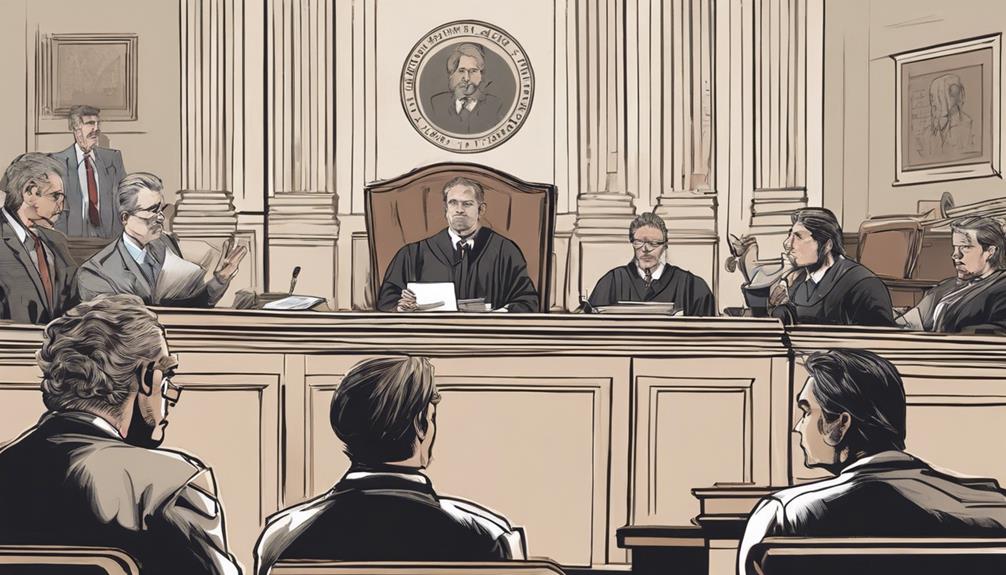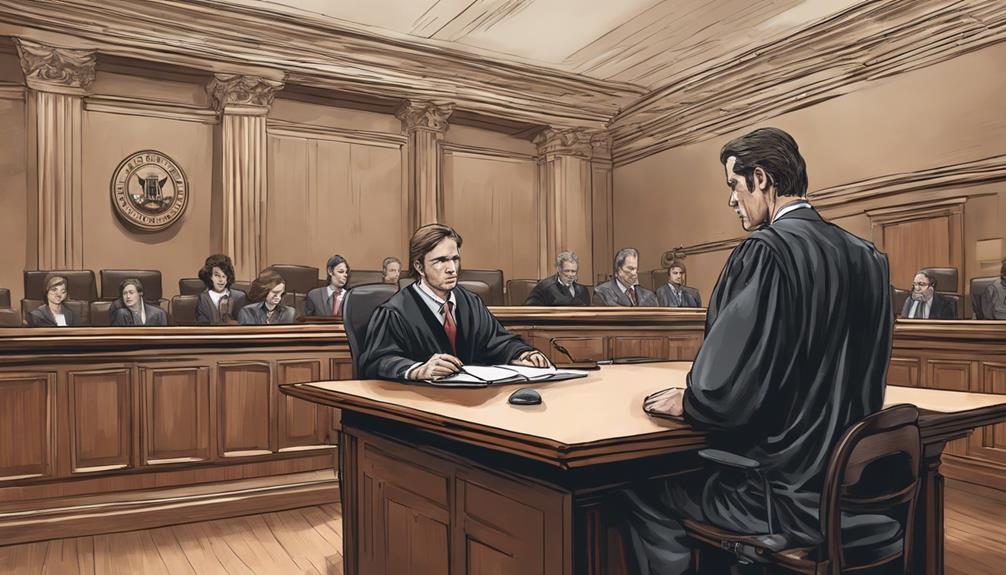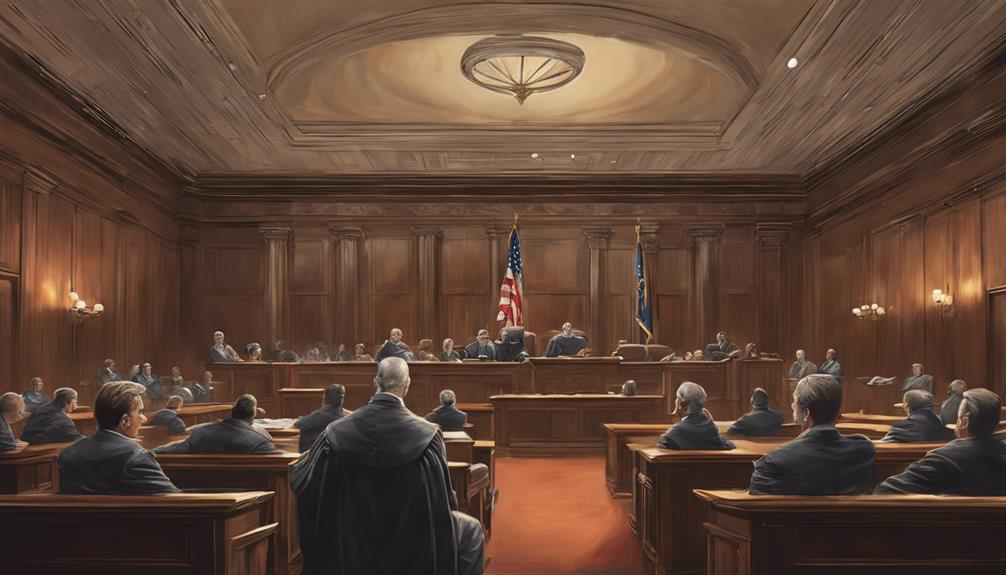During bail hearings, the court carefully reviews the situation of a person who is being held in custody. It considers important factors like safety and the likelihood of the individual running away, which play a significant role in the decision to keep them detained. Parents, attorneys, and supporters can greatly benefit from grasping this procedure. Interested in knowing more about what happens during these hearings? Continue reading to gain a deeper understanding of this important legal process.
However, there’s more to these hearings than meets the eye. As we explore the various aspects influencing this decision-making process, we’ll uncover the complexities that highlight the importance of understanding the ins and outs of a detention hearing.
Key Takeaways
- Legal representation crucial for fair defense and release advocacy.
- Factors like criminal history, community ties, and evidence strength considered.
- Preparation involves evidence gathering, strategic defense planning, and addressing risk factors.
- Detention hearings assess flight risk, danger, evidence, and legal representation impact.
Purpose of Detention Hearings
Detention hearings serve as critical assessments conducted promptly after a child’s custody to determine the necessity for continued detention. These hearings play a crucial role in evaluating whether the child is a flight risk or poses a danger to themselves or others. Evidence, reports, and testimonies are carefully reviewed during the hearing to facilitate a comprehensive decision-making process. It’s essential to provide the child with legal representation, which is typically appointed before the first detention hearing to ensure fairness and protection of rights.
The ultimate goal of a detention hearing is to establish suitable release conditions or decide on extending the child’s detention period based on the specific circumstances presented. By considering all the relevant factors and information, the court aims to make an informed decision that prioritizes both the child’s well-being and the safety of the community. Detention hearings are instrumental in safeguarding the rights of the child while balancing the need for accountability and protection.
Defendant’s Rights During Hearing

Ensuring the defendant’s rights to legal representation and the opportunity to cross-examine witnesses is paramount during the detention hearing process. A defendant has the right to an Attorney, whose role is crucial in presenting a strong defense. The court mandates a detention hearing for Federal cases, where the decision to release or detain the defendant is determined. The Attorney plays a vital role in advocating for the defendant’s release under appropriate conditions, such as regular check-ins or electronic monitoring, to ensure compliance with court orders.
During the hearing, the defense has the opportunity to cross-examine witnesses brought forward by the Government. This step is essential in challenging the evidence presented and protecting the defendant’s rights. The United States Criminal Defense system relies on the fair treatment of individuals, and the court must uphold these principles throughout the proceedings. By adhering to these rights, the court can guarantee a just and transparent process for all involved.
Factors Influencing Judge’s Decision
Considering various critical factors, the judge meticulously evaluates elements such as the defendant’s criminal history, flight risk, community ties, and evidence strength when making decisions during the detention hearing. Factors influencing the judge’s decision include:
- Criminal History: Past convictions and offenses play a crucial role in determining the risk posed by the defendant.
- Community Ties: The defendant’s connections to the community, employment status, and family support are pivotal in assessing their likelihood of fleeing.
- Substance Abuse and Mental Health: Any history of violence, substance abuse, or mental health issues is carefully considered due to its impact on the defendant’s behavior and potential risk to society.
These factors, along with the strength of evidence presented and the potential danger the defendant poses to the community, guide the juvenile court judge in determining whether a detention order is necessary. By weighing these aspects, the judge aims to make a well-informed decision that prioritizes both public safety and the defendant’s rights.
Importance of Legal Representation

In understanding the critical role of legal representation during a detention hearing, it becomes evident that skilled attorneys play a pivotal role in safeguarding the defendant’s rights and advocating for their interests. A competent criminal defense attorney can adeptly navigate the intricate procedures of a detention hearing, offering strategic defense strategies and effectively challenging the government’s evidence.
By skillfully cross-examining witnesses, presenting compelling evidence, and articulating legal arguments, defense attorneys can significantly impact the court’s decision on detention. Experienced legal representation can sway the outcome by highlighting factors such as strong community ties, minimal flight risk, and proposing favorable conditions for release.
The presence of a knowledgeable lawyer during a detention hearing is paramount, as it can potentially lead to securing release on bond or under other favorable circumstances. Therefore, securing skilled legal representation is essential in ensuring a fair and just outcome for the defendant in a detention hearing.
Preparing for a Detention Hearing
To prepare effectively for a Detention Hearing, meticulous gathering of all pertinent documentation, collaboration with legal counsel on defense strategies, and careful consideration of key factors influencing the court’s decision are essential.
When getting ready for the hearing, it’s crucial to:
- Gather all relevant evidence, including witness statements and legal arguments, to strengthen your defense.
- Strategize with your attorney on presenting mitigating factors and challenging any allegations against you.
- Address factors such as flight risk, ties to the community, and compliance with court orders to demonstrate your reliability and stability.
During the hearing, provide character witnesses, employment records, and any other evidence that showcases your positive attributes. Understand the burden of proof required for detention and work diligently to counter any adverse claims effectively.
Frequently Asked Questions
What Is a Detention Hearing and the Purpose of the Hearing?
We believe a detention hearing serves to determine if a child should be detained or released, considering factors like flight risk and danger to self or others. Legal representation is essential, and statements made are generally not admissible in subsequent proceedings to protect the child’s interests.
This process aims to balance the child’s rights with public safety and the need for appropriate decision-making based on the circumstances at hand.
How Long Can a Juvenile Be Detained in Texas?
We found that in Texas, a juvenile can be detained for up to 48 hours without a probable cause finding. If probable cause is established, the detention can be extended for an additional 10 days.
Various factors, such as the nature of the offense and public safety risks, influence the duration of detention for juveniles in Texas. The length of detention can be further determined by a detention hearing held within 2 working days of initial detention.
What Is a Detention Hearing Texas?
In Texas, a detention hearing is a legal proceeding held promptly after a juvenile is taken into custody to determine if they should be held in secure detention. Factors like prior delinquent behavior and conditions for release are considered to ensure future court appearances. A referee may provide recommendations to the judge.
Legal protections safeguard statements made during the hearing, and specific criteria must be met for a valid shelter request.
What Is the Presumption of Detention in Federal Court?
In federal court, the presumption of detention operates like a spotlight, shining brightly on cases involving serious crimes. Offenses such as drug trafficking or violent acts trigger this automatic assumption that the defendant should remain in custody. This places the burden on the defendant to present evidence to counter this presumption during proceedings.
Factors like flight risk and community safety are carefully weighed in determining whether detention is necessary.
Conclusion
In conclusion, a detention hearing isn’t just a simple formality – it’s a critical moment that can make or break a child’s future. With stakes this high, proper legal representation isn’t just important, it’s absolutely essential.
So, when preparing for a detention hearing, make sure to leave no stone unturned and arm yourself with the best defense possible. Your future depends on it.









